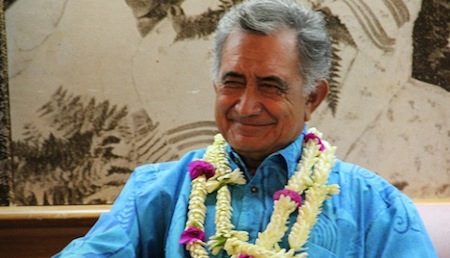Although you may be aware of Malaysia’s blockbuster elections yesterday and even elections held yesterday in the 60 million-plus Indian state of Karnataka, you may not have realized that French Polynesia also held elections on May 5.![]()
Polynésie française exists officially as an overseas country within the French republic — and its most well-known and populous component is the island of Tahiti (around 70% of the country’s population), though the entire French Polynesian nation comprises a huge group of islands over a wide swath in the south Pacific Ocean.
Though its population, at around 270,000 people, is less than you’d find in Iceland, French Polynesia’s islands cover an area larger than Europe, and they are a highly strategic holding for France, which has controversially engaged in nuclear testing on one of the islands, Fangataufa, most recently in 1995.
The high commissioner, Jean-Pierre Laflaquière, and the French government, which sits nearly 10,000 miles away, holds the final say on the ‘overseas country’s’ policy on justice, security, defense and even its education. That’s one reason why the independence movement has attracted more attention in recent years, including as in the lead-up to Sunday’s election for the territorial assembly.
Politics in French Polynesia is dominated by the personal rivalry between two leaders: its current president Oscar Temaru (pictured above) and the leader of the opposing, conservative, anti-independence Tāhōʻēraʻa Huiraʻatira (Popular Rally), Gaston Flosse. Flosse dominated local politics for decades until 2004, when Temaru first won local elections, though power has revolved among Flosse, Temaru and Flosse’s one-time ally, Gaston Tong Sang. Temaru leads the more leftist, pro-independence Tavini Huiraatira (People’s Servant), one of several parties that comprise the larger Union pour la Démocratie (Union for the Democracy) coalition that Temaru also heads.
Temaru has spent his entire political career of four decades in pursuit of one goal — full independence for French Polynesia. It’s a goal that Temaru appeared to be closer to achieving in the past couple of years, winning support from the French Polynesian assembly in 2011 for a petition to place French Polynesia back on the United Nations’s list of nations to be decolonized. Sunday’s result is widely seen as a result of discontent over an unemployment rate of between 20% and 30% and a poverty rate of around 20% throughout the islands rather than a rebuke against independence, though it’s hardly clear that Tahitians and the rest of French Polynesia remain incredibly enthusiastic about independence.
Following Sunday’s election, power seems likely to revolve once again from Temaru to Flosse, which means that the flickers of life for French Polynesian independence are likely to recede in the coming years.
GDP per capita, however, is nearly $20,000 on the islands, thanks both to French financial assistance and to a tourism industry that has made Tahiti, Bora Bora and other French Polynesian islands some of the sexiest vacation spots in the world and a retirement destination for many French nationals.
Between the assistance from France and the strength of its tourism revenue, French Polynesia’s economy remains stronger than the rest of the fully independent nations in the neighborhood. The same is true for New Caledonia, which has received French assurances of its own independence referendum between 2014 and 2019. But the remaining states in Oceania with a population close to that of French Polynesia are far less developed:
- Fiji, which also became independent from the United Kingdom in 1970, has a GDP per capita of $4,800.
- The Solomon Islands, independent from the United Kingdom in 1978, has a GDP per capita of just $3,400.
- Vanuatu, independent (again from the UK) in 1980, has a GDP per capita of $4,900
- Samoa (formerly Western Samoa), which won its independence from New Zealand in 1962 after years as a German colony has a GDP per capita of just $6,200, less than an estimate of upwards of $8,000 in American Samoa.
Accordingly, independence would leave French Polynesia with a much more uncertain future and without access to budgetary supplements from Paris. In a world where even the economic star of Oceania has significant poverty and unemployment, it would seem like a precarious step for a such a small nation to go it alone.
Despite a landslide victory in the 2008 elections that brought Temaru control of 27 of the territorial assembly’s 57 seats, Temaru’s forces now appear to have lost the 2013 elections. In the first round on April 21, Flosse’s party won 40.16% of the vote to just 24.09% for Temaru’s Union for Democracy and a non-Flosse, non-Temaru third party, A Tia Porinetia, won 19.92%. Under the French Polynesian electoral system, each party that wins in excess of 12.5% of the vote proceeds to the second round, which was held Sunday, and which resulted in Flosse’s party winning 38 seats, despite two recent corruption convictions for Flosse, who remains out of jail pending an appeal.

No bother Laura. Very happy to unfold a love that is little around. Hope the songs are coming along perfectly.